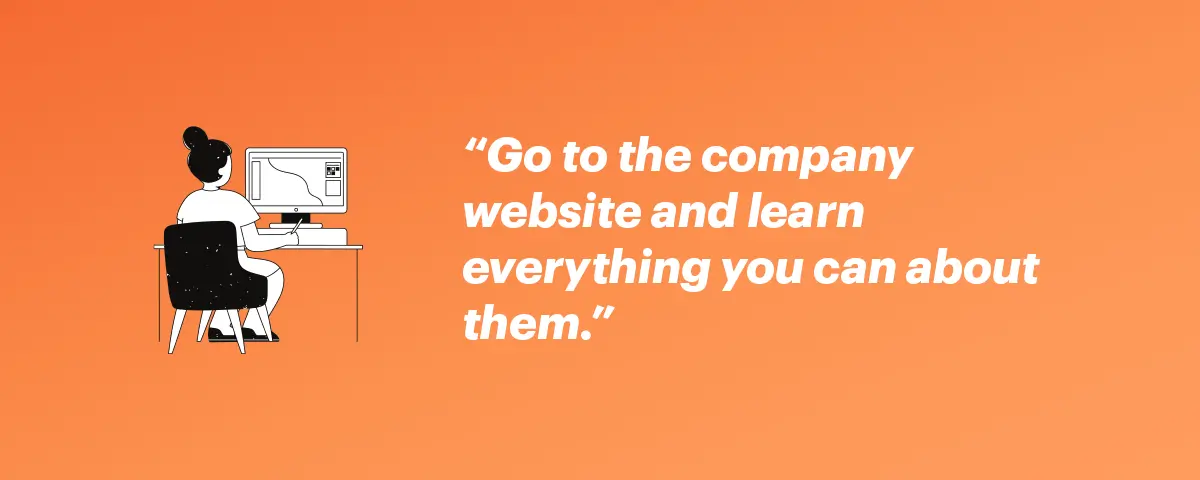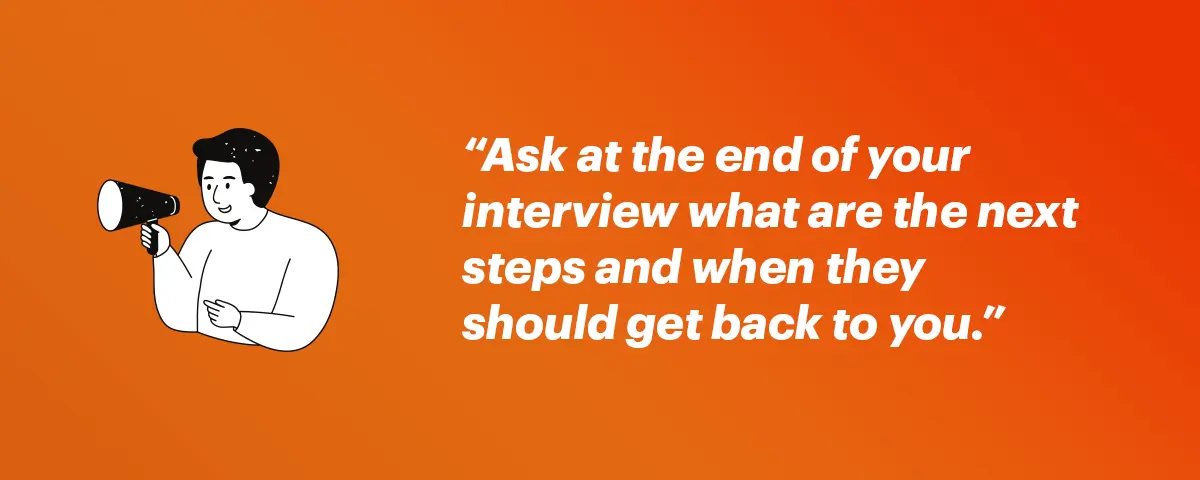Imagine you could get solid job search advice directly from someone with experience in recruiting and HR. Wouldn't that be helpful? Now you can do just that thanks to our new interview series Recruiter Reveals! Every month I interview our resident HR expert Christy Morgan on various job search topics — be it resumes, cover letters, job interviews, or anything marginally career related. |
Your resume and cover letter were super impressive. You got the call. Now you just have to seal the deal.
Our resident job interview coach and former hiring manager Christy will help you nail your next job interview.
At the end of the day, it's no rocket science. It's just a job interview. If you got invited, it means that you already look good on paper. The company simply needs to see you in person to confirm that you're a match.
Let us show you how to convince them that you are!
In this interview, you'll find out:
- “Must-knows” of job interview preparation;
- What other things to prepare for if you have a virtual interview;
- What do hiring managers notice about you when they first meet you;
- What's the in-person interview etiquette during COVID;
- What's the key to successful job interviews;
- Things to never talk about at a job interview;
- What other mistakes may hurt your chances;
- How to follow up the right way.
You have experience with doing job interviews as a hiring manager, so let's have a look at it from your perspective. Let's say you've invited me for an interview. What do you expect from me as a job candidate?
The number one thing I expect is that you do your research — about the company and the position. Go to the company website and learn everything you can about them. Go also to sections like Media, look for any quotes or articles. Visit their LinkedIn profile. Check out who their main competitors are. Check out the things they're doing really well at the moment, or also things they're not doing so well, because depending on your role, you could use that in your examples at your interview.
If possible, even check out the person who's interviewing you (in this case me :D). Of course, I don't advise creeping somebody's LinkedIn profile — better do it in private mode. Also if possible, look at the profile of the current/previous role holder, and the job description they’ve put on LinkedIn. This will give you insight into the actual role and previously successful hires.
Anything else?
I also expect that you'll know your resume and will respond to questions about your experience without huge pauses. So, go through your resume a few times, and try to think in advance of some relevant examples you can reference from it, for instance a successful project. Write these down in STAR format (Situation, Task, Action, Result). and you'll have some great examples ready up your sleeve.
Do you also recommend preparing for the most common job interview questions?
You can’t precisely predict what they're going to ask, but something you can do is to practice responding to questions about your specific role type. For instance, if you're applying for an accountant job, google the most common questions for accountants. You can also check the company on Glassdoor - sometimes people put interview questions for particular roles there. And don’t forget to practice your STAR examples about noteworthy accomplishments.
That's a lot of preparation which some people rather omit. What happens if you see that I didn't prepare for a job interview at all?
It kind of influences your perception of the person. Companies want to see that you're interested in them and their role. So, you should always do your preparation and research. There's so much competition out there and if you don’t come prepared, it may influence their decision.
It's not only from the subjective perspective of the hiring manager. Objectively, if you’re not prepared, then you may not provide them with enough objective evidence to back up what you have on your resume. Preparation is super important. Also, I think lack of preparation can affect your confidence and performance at an interview, particularly if you’re nervous.
Ok, the next step is probably preparing my job interview outfit. What do you suggest? Should I check the company's website and dress based on how formal they are?
Yes, exactly. Sometimes you can tell their dress code by looking at what employees are wearing in pictures on their website. If not, see if there’s anything mentioned on sites such as Glassdoor. Check their brand voice and whether they're serious or more friendly. Or if you know someone who works at the company, ask them. If all of these fail, go business casual. Not too formal, not too casual, something in between.
Let's say I've prepared and it's the day of my job interview. What should I bring?
Bring a copy of your resume, just in case. If they ask questions about your resume, you’ll have it ready. It also means you can have some discrete prompts ready about specific points, if you're particularly nervous or want to discuss certain aspects from your experience.
Now during the coronavirus pandemic you can also bring your own pen, just in case. :D
Yes, that's actually a very good point! :D Take also your mask of course, hand sanitizer too. Also, wait to see if the interviewer shakes your hand during the pandemic, don't offer it yourself. Because it might be a company that’s super strict about distance and if you reach out, you're already giving a negative impression. Just see what they do and take it from there. You won't make them feel uncomfortable and you'll show that you follow regulations and have respect for other people.

What are the first things you'll notice about me when I come for a job interview?
Attitude, friendliness, expressions, what you're wearing and whether it's appropriate, whether you look nervous or confident, if you're someone I'd want to work or hang out with. These sorts of things. Pre-pandemic, also the handshake could tell quite a lot about the person.
And what are the things you want to find out about me during the job interview?
Generally, whether you’re a good fit. Your resume tells me that you potentially are, so the interview should confirm that. Are you somebody that fits into the company's culture? Are you somebody who I want to work with? Do you come across as sincere? Do you come across as if you're interested? These are things I'm also looking for.
Let's say we've made our introductions, now you as a hiring manager proceed with the job interview. What's your favorite interview question that you'll ask me?
I can't think of my favorite one but I can tell you which questions I don't like. :D For instance, “If you were an animal, what animal would you be?” I think many companies ask these types of questions because Google really started the trend for non-traditional questions, so they think it’ll make them seem cool and progressive to do the same thing. But the big difference is that Google pioneered these kinds of interview questions. They’re based on solid research, and asked by highly-trained recruiters who understand the methodology.
When I worked in Dublin years ago, my company recruited for Google. I remember my colleagues who sourced people for them said that Google candidates had to do something like 9 or 10 rounds of interviews. They ask you seemingly weird questions but the thing is, they've done their research. Their questions are designed that way for a reason and they know how to ask and analyze them. It’s a science.
A lot of companies see Google's doing it and say “Oh, let's do the same thing!”, but they haven't done the research, they don't fully understand the psychology behind the questions, and interviewers aren't necessarily trained in the methodology. So, these kinds of questions are not necessary at many job interviews - I think each question should have a clear purpose.
So, what kind of questions would you ask me?
Myself, I stick to very practical questions. Sorry! It’s nice that you’d like to be a dolphin, but I’m not sure it affects how you do your job (at least, I hope not!). At the end of the day, it's a job interview, not rocket science. You seem like a good fit on paper, so we need to see if you're a match for us and if we’re a match for you. So, I'd only ask relevant questions about your professional background and abilities, or something related to the job and company, no animal questions. :D
So, do you think these general questions are completely redundant?
Too general questions - yes. For example “Tell me a bit about yourself”. For me, these are filler questions, too vague. You should already know this anyway from their resume. I think that interview questions should always be relevant, related to the job and cultural fit as well.
And what should I do to nail my answers?
The preparation we talked about earlier is absolutely essential because that's going to influence your confidence, how you come across, your ability to answer questions precisely and relevantly. That's number one. Also, prepare good and relevant examples so you can back up your experience with evidence.
Apart from examples, I recommend that you prepare 2-3 questions to ask them at the end of the interview. This part is super important. Of course, I don't mean questions about salary but relevant and very precise questions based on the job, maybe focused on something that you've learned about them. For example, you're applying for a product manager role and you may ask “I understand that x product was supposed to roll out nationwide by March 2020. So far, it’s only available in California. I’m curious about the reasons for this and your opinion about what the new Product Manager should address, if anything, to complete the roll out?” Something like that.
As for the salary question, should I wait till you (the hiring manager) start talking about it?
Yes, never be the one to bring up salary first at interview. Of course, we all want to be paid well but according to interview etiquette, you shouldn't start this conversation yourself because it will look like you only want the job because of the money. So, wait till they mention it.
Should it be discussed at a job interview or after when they call me and are interested?
It depends on the individual recruiter. If they haven’t screened for this already, they will probably bring it up during the interview, but some might discuss it later when they’re ready to go forward with you. The rule of thumb is to never bring it up yourself first.

What are some other things I should never talk about at a job interview?
Try not to bad-mouth people. They may ask you why you're leaving your current job and you definitely shouldn't say “Oh, because my boss is terrible!” Try to avoid that, whether it's true or not. Stick to objective and relevant things and avoid making yourself look negative.
Because they're judging you based on everything you say and again, cultural fit is important nowadays. They might think that if you're bad-mouthing your current boss or colleagues, you might do it to them too. You can say you're trying to advance your career, or there are no career opportunities available, or they're restructuring because of the pandemic.
Also, keep things away from politics or gossip.
When it comes to a virtual job interview, what's different in terms of preparation? Compared to regular job interviews.
As for the research before a job interview, you should do the same preparation. Then it comes to other things. When you normally do a face-to-face interview you're in their environment, when you're doing a virtual interview, you're sharing your environment. So, you need to make sure your background and lightning are good, that your bed is not visible, for instance. :D Just making sure it looks respectable. Also, try to minimize background noise as much as possible, if you have kids for instance. If the interviewer is put off by your cat sleeping on your lap, however, I might take that as a sign that it’s probably not a company I’d like to work for.
How can I make a great first impression virtually, when we're not shaking hands, they can't see much of what I'm wearing, etc.?
Eye contact, smiling, friendliness (not too friendly though). Act confident!
On your LinkedIn, you shared a story where a candidate was rejected due to issues with connecting to an MS Teams video interview, even though the interview went ahead. The company questioned the candidate’s technology skills. Does this happen often?
That's the first time I've heard of something like that, because they were one of my clients. But it happens more often, I’m sure. I think it’s unfair because the technology can fail, sometimes the connection isn't that good, you may have kids doing home schooling at the same time so the WiFi might have a bit of traffic. These things just happen at both ends. I feel like the interviewer should give the benefit of the doubt and at least reschedule the interview.
But this is a good point in terms of virtual interview preparation — check your technology. Make sure you know how everything works, whether it's working well and you have it updated. Do a quick test call to see if the microphone and camera are working properly.
Did your other clients also have some bad experience with virtual job interviews?
Yes, and I think it was even the same client. He had a panel virtual job interview and everyone was on their phone and weren't paying attention to him, even though he was answering the questions and trying to interact with them. So, obviously, he didn't progress with that one.
That's so rude.
Exactly. They're expecting candidates to be prepared, professional, on time, know how to use technology, etc., so they should play their part, too. Often, it seems like a one-way street where a candidate has to do the work and the interviewer just shows up. But they both should be professional.
With remote jobs, people can now apply for a job anywhere. Do the job interview techniques vary? Should people prepare differently based on where they're applying?
Yes, there are some general differences depending on the country. For instance, some Asian countries tend to be more modest, Americans like to look confident and expect you to talk about your achievements, and so on. Especially with remote working, I recommend googling the typical corporate culture in the given country and common interview techniques as well. Because they might be a bit different, depending on the region and country.

After the interview, virtual or not, do you expect me to follow up?
I think it's always good to send a thank-you note afterwards. Send it on the same day, but give it an hour or two. Something like “Thank you very much for your time, I really appreciated meeting with you.” Also, point out a thing or two from the interview, e.g. “I enjoyed learning more about your current infrastructure projects and your ambitious expansion targets for 2021.” Whatever it is, just reference back to some things that you learned during your interview. Because then it's not generic and has a bigger impact.
As for the follow up, you can ask at the end of your interview what are the next steps and when they should get back to you. And then if they don't come back to you in a reasonable time frame, then you can follow up with a quick message. Just don't be too keen and pushy. Generally, it’s reasonable to know about the interview outcome within a week, ideally sooner.
Did you ever blacklist someone due to excessive follow up?
No, I wouldn't blacklist them, but I'd maybe just get a bit of a negative impression of them.
What other tiny thing would make you reject me (or select me)?
Lack of preparation tends to put me off because you can see they don't care. Also cancelling the interview at the last minute for non-serious reasons, especially if you could have told me sooner.
On the other hand, I always get a positive impression if someone comes across as prepared, they give me more depth to their resume, they seem like a great fit and they do seem like somebody who's going to be good to work with. Even if they’ve had to reschedule, it’s all about how they’ve handled it in terms of consideration for the other person’s time.
Key takeaways: How to ace an interview
- Interview preparation: Know your resume and do your research. Check the company's website, their Media section, LinkedIn and other social media profiles, and so on. Know everything about the job. Prepare relevant examples demonstrating your skills using a method such as STAR. Check common interview questions for your role and also the company's job interview questions on Glassdoor. Prepare relevant questions that you'll ask at the end of the interview.
- Virtual job interview preparation: Do the same research, but also check the lighting and make sure the background is professional. Try to minimize background noises. Test the technology — the app, microphone, camera, etc. If it's an interview with a remote company in a different country, also check the typical corporate culture in the given country and the interview techniques as well.
- Job interview outfit: Check the company's website — find information about their dress code or see whether they're formal or rather informal. Alternatively, google it or check Glassdoor. If you know someone who works at the company, ask them. If all of these fail, go business casual.
- In-person interview etiquette during COVID: Take your mask, hand sanitizer and your own pen with you to a job interview. Also, wait for the interviewer to see whether they reach out and shake your hand, don't offer it yourself.
- Things not to talk about: Don't ask about the salary first - wait for the interviewer to bring it up. Also, don't bad-mouth your previous boss or colleagues, don't talk politics or gossip.
- Most common job interview mistakes: Not coming prepared, not understanding the company or the job, not asking the right questions at the end of the job interview, being overly keen about the follow up.
- Follow up: At the end of the interview, ask about next steps. If they don't reach out within the agreed time frame, follow up with a short message. Also, send a personalized thank-you note after the interview (on the same day).
Geared up to ace interviews, virtual or not, thanks to the recruiter's tips? Perfect! To ensure your resume complements your interview prowess, use our AI-powered resume builder to create an impressive resume that secures you those important interviews.




